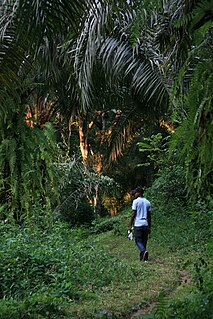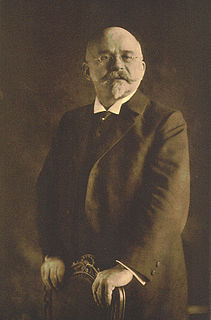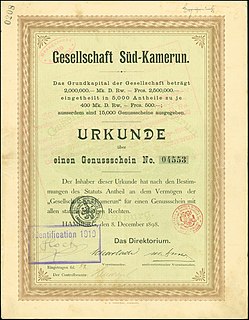Related Research Articles
At the crossroads of West Africa and Central Africa, the territory of what is now Cameroon has seen human habitation since some time in the Middle Paleolithic, likely no later than 130,000 years ago. The earliest discovered archaeological evidence of humans dates from around 30,000 years ago at Shum Laka. The Bamenda highlands in western Cameroon near the border with Nigeria are the most likely origin for the Bantu peoples, whose language and culture came to dominate most of central and southern Africa between 1000 BCE and 1000 CE.

Kamerun was an African colony of the German Empire from 1884 to 1916 in the region of today's Republic of Cameroon. Kamerun also included northern parts of Gabon and the Congo with western parts of the Central African Republic, southwestern parts of Chad and far eastern parts of Nigeria.

Adamawa State is a state in the North-East geopolitical zone of Nigeria, bordered by Borno to the northwest, Gombe to the west, and Taraba to the southwest while its eastern border forms part of the national border with Cameroon. It takes its name from the historic emirate of Adamawa, with the emirate's old capital of Yola serving as the capital city of Adamawa State. The state—one of the most heterogeneous in Nigeria with over 100 indigenous ethnic groups—was formed in 1991 when the former Gongola State was broken up into Adamawa and Taraba states.
The Vengo, or Babungos, are an ethnic group of about 14,000 people who are resident in the anglophone Northwest Province of Cameroon. They live predominantly in the region of a village which is also called Vengo or "Babungo". This village is located in the Cameroonian Grassfields at the so-called "Ringroad", approximately 50 km West of the province's capital Bamenda. The language of the people is also called Vengo or "Babungo". For the tribe, village and language the spelling "Bamungo" is also often found.

German West Africa (Deutsch-Westafrika) was an informal designation for the areas in West Africa that were part of the German Colonial Empire between 1884 and 1919. The term was normally used for the territories of Cameroon and Togo. German West Africa was not an administrative unit. However, in trade and in the vernacular the term was sometimes in use.

The German West African Company, in German Deutsch-Westafrikanische Gesellschaft / Compagnie, was a German chartered company, founded in 1885. It exploited the two German protectorates in German West Africa but did not actually govern them — unlike its counterpart in German East Africa.

The Bassa are a Bantu ethnic group in Cameroon. They number approximately 800,000 individuals. The Bassa speak the Basaa language.

Neukamerun was the name of Central African territories ceded by the Third French Republic to the German Empire in 1911. Upon taking office in 1907, Theodor Seitz, governor of Kamerun, advocated the acquisition of territories from the French Congo. Germany's only major river outlet from its Central African possessions was the Congo River, and more territories to the east of Kamerun would allow for better access to that waterway.

Julius Scharlach was a Hamburg lawyer, businessman and a prominent figure in the colonial history of Germany in the late 19th and early 20th century. He was a member of the Colonial Council, and founded the Verein für das Deutschtum im Ausland (VDA).

Postage stamps have been used in Cameroon or Cameroun since the nineteenth century.
Ossidinge was a government station and capital of the prefecture in the German colony of Cameroon.

This article is a survey of the postage stamps and postal history of the British Cameroons. It falls into two essential parts: the occupation of German Kamerun by Anglo-French forces in 1915, when German Colonial stamps were issued with an overprint and surcharge; and the situation following a 1961 plebiscite, after which the former British Cameroons, today known as Ambazonia, was divided between Cameroon and Nigeria.

Eugen Ritter von Zimmerer was an attorney, prosecutor and judge in Bavaria before he entered the colonial service in 1887 when he was in his 40s. He served in German colonies of Kamerun and Togo before being appointed as governor of Kamerun, serving between 1890 and 1893. Following that, Zimmerer was assigned to posts in Brazil, Chile and Haiti before retiring and returning to Germany.
Events in the year 1916 in Germany.

The Kamerun campaign took place in the German colony of Kamerun in the African theatre of the First World War when the British, French and Belgians invaded the German colony from August 1914 to March 1916. Most of the campaign took place in Kamerun but skirmishes also broke out in British Nigeria. By the Spring of 1916, following Allied victories, the majority of German troops and the civil administration fled to the neighbouring neutral colony of Spanish Guinea. The campaign ended in a defeat for Germany and the partition of its former colony between France and Britain.
The Battle of Tepe on 25 August 1914 was the first skirmish between German and British forces during the Kamerun Campaign in of the First World War. The conflict took place on the border between British Nigeria and German Kamerun, ending in British victory and German withdrawal from the station.

The history of rail transport in Cameroon began at around the turn of the twentieth century.

The Gesellschaft Süd-Kamerun was a private trading corporation formed in 1898, facilitated by governor Jesko von Puttkamer, to run the rubber and ivory trade in the southeast of the German colony of Kamerun.

The Cameroon worm lizard is a species of worm lizard in the family Amphisbaenidae. The species is endemic to Cameroon.
References
- ↑ Levine, V.; Vine, V.T.L. (1964). The Cameroons: From Mandate to Independence. University of California Press. p. 26. Retrieved 2015-06-25.